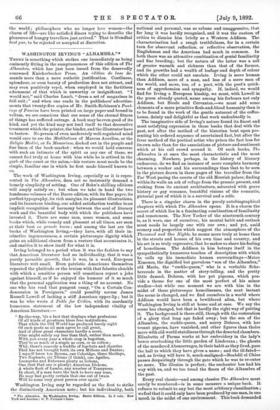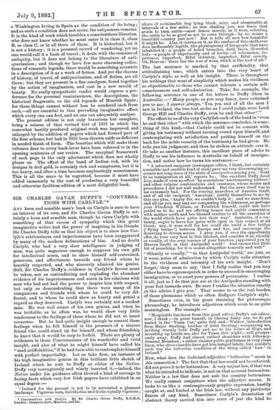WASHINGTON IRVING'S " ALHAMBRA."*
THERE is something which strikes one immediately as being eminently fitting in the sumptuousness of this edition of The Alhambra, which has just been issued from the deservedly renowned Knickerbocker Press. An edition de lure de- mands more than a mere msthetic justification. Costliness, splendour, or even beauty of production does not attract, and may even positively repel, when employed in the factitious adornment of that which is unworthy or insignificant. "I
would not," said Charles Lamb, "dress a set of magazines in full suit ;" and when one reads in the publishers' advertise-
ments that twenty-five copies of Mr. Smith-Robinson's Pant- -lags of Passion have been printed on large paper and bound in vellum, we are conscious that our sense of the eternal fitness
of things has suffered outrage. A book may be even good of its kind, and yet the kind may not lend itself to that decorative treatment which the printer, the binder, and the illustrator have
to bestow. No person of even moderately well-regulated mind would care to see the Meditations of Marcus Aurelius, or the Religio Medici, or In Memoriam, decked out in the purple and fine linen of the book-market : when we would hold converse
with such an intimate of the spirit as any one of these, we cannot feel truly at home with him while he is attired in the garb of the court or the salon,—his vesture must needs be the simple, familiar one in which he first made himself known to us.
The work of Washington Irving, especially as it is repre-
sented in The Alhambra, does not so insistently demand a homely simplicity of setting. One of Bohn's shilling editions will amply satisfy us ; but when we take in hand the two handsome volumes of the Da,rro edition, with its fine paper, its
perfect typography, its rich margins, its pleasant illustrations, and its luxurious binding, our added satisfaction testifies to an implicit recognition of harmony between the soul of literary work and the beautiful body with which the publishers have
invested it. There are some men, some women, and some books which, while comely and pleasant at all times, are seen at their best en grande tenue ; and among the last are the books of Washington Irving,—they have, with all their in-
stinctive ingenuousness, a certain picturesque dignity which gains an additional charm from a vesture that accentuates it, and enables it to show itself for what it is.
Irving belonged to a period when it was the fashion to say that American literature had no individuality, that it was a purely parasitic growth, that it was, in a word, European literature writ small. Even patriotic Americans themselves repeated the platitude or the truism with that falsetto chuckle with which a sensitive person will sometimes repeat a joke against himself, as if he enjoyed the humour of it so much that the personal application was a thing of no account. No one who has read that pungent essay, "On a Certain Con- descension in Foreigners," could possibly accuse James Russell Lowell of lacking a stiff American upper-lip ; but it
was he who wrote A Fable for Critics, with its mordantly
humorous statement of the low independent vitality of American literature :— "By-the-way, 'tis a fact that displays what profusions Of all kinds of greatness bless free institutions, That while the Old World has produced barely eight Of such poets as all men agree to call great, And of other great characters hardly a score, (One might safely say less than that, rather than more), With you every year a whole crop is begotten, They're as much of a staple as corn, or as cotton ; Why, there's scarcely a huddle of log-huts and shanties That has not brought forth its own Miltons and Dantes ; I myself know ten Byrons, one Coleridge, three Shelleys, Two Raphaels, six Titians (I think), one Apelles, Leonardos and Rubenses plenty as lichens, - One (but that one is plenty) American Dickens, A whole flock of Lambs, any number of Tennysons.
In short, if a man have the luck to have any sons, He may feel pretty certain that one out of twain Will be some very great person over again."
WashiniFton Irving may be regarded as the first to strike the distinctively American note; but his individuality, both • The Alhambra. By Washington Irving. Darro Edition. In 2 vols. New York and London : G. P. Putnam's Sons.
national and personal, was so urbane and unaggressive, that for long it was hardly recognised, and it was the custom of critics to dismiss him briefly as a Western Addison. The characterisation had a rough truthfulness, for in a certain turn for observant reflection, or reflective observation, the Englishman and the American had much in common. In both there was an attractive combination of genial familiarity and fine breeding; but the nature of the latter was a soil of greater warmth and richness than that of the former, and its growths had a wealth of leafage and depth of colour which the other could not emulate. Irving is more human than Addison, more of a man, and less of a mere man of the world, and more, too, of a poet, with the poet's quick- ness of apprehension and sympathy. If, indeed, we would find for Irving a European kinship, we must, with Lowell in the poem already quoted, name among his forbears not only Addison, but Steele and Cervantes,—we must add some elements of a more primitive flesh-and-blood humanity than is to be found in the work of the gentle autocrat of the coffee- house, dainty and delightful as that work undoubtedly is.
The imaginative side of Irving's nature found its finest and most satisfying expression in those books that deal with the past, not after the method of the historian bent upon pre- senting his ordered sequence of ascertained fact, but after the freer method of the poetical artist who prizes the fact less for its own sake than for the associations of picture and sentiment which at his call crowd around it. Of such books, The Alhambra is at once the most characteristic and the most charming. Nowhere, perhaps, in the history of literary endeavour, do we find an instance of more complete harmony between a worker and his surroundings than that to be seen in the picture drawn in these pages of the traveller from the Far West pacing the courts of the old Moorish palace, finding within its walls an ark of refuge from the prosaic present, and evoking from its ancient architecture, saturated with grave history or gay romance, beautiful visions of the romantic, pictorial past of which it is a survival and a relic.
There is a singular charm in the purely autobiographical chapters with which The Alhambra opens. It is a charm the secret of which lies in a fascinating combination of familiarity and remoteness. The New Yorker of the nineteenth century is, as it were, one of ourselves; his mental habit and outlook must needs be largely one with our own; and yet, amid scenery and properties which suggest the atmosphere of the Thousand and One Nights, he seems more truly at home than in the streets and houses of his own time and country, and his art is so truly expressive, that he makes us share his feeling of homeliness. The Addison in him betrays itself in the sympathetically humorous touches of description with which he calls up his immediate human surroundings—Mateo Ximenes, the dignified but garrulous "son of the Alhambra," old Maria, the "cockle-queen," who is a veritable Sche- herezade in the matter of story-telling, and the pretty little damsel, Dolores, with her pet pigeons, which pro- vide a theme for one of the most perfect of his minor studies—but while one moment we are with him in the midst of these picturesque homelinesses, the next instant the scene is changed, and we find ourselves in a world where Addison would have been a bewildered alien, but where Washington Irving is still at home and at ease. We say the scene has changed, but that is hardly the right way of putting it. The background is there still, though with the restoration of a glory that long ago faded away; but the son of the Alhambra, the cockle-queen, and merry Dolores, with her truant pigeons, have vanished, and other figures than theirs move with old-world stateliness through the deserted chambers. Elizabetta of Parma works at her embroidery in the lady's bower overlooking the little garden of Linderaxa ; the ghosts of the murdered Abencerrages, in their habit as they lived, pace the hall to which they have given a name ; and the ill-fated— and, as Irving will have it, much-maligned—Boabdil el Chico passes despairingly through the gate which he was to re-enter no more. The illusion is perfect; the enchanter has had his way with us, and we too tread the floors of the Alhambra of the past.
Every real classic—and among classics The Alhambra must surely be numbered—is in some measure a unique book. It refuses to submit to any but the most arbitrary classification ; wefeel that it could only have been produced by one man, in one mood, in the midst of one environment. This book demanded a Washington Irving in Spain as the condition of its being ; and as such a condition does not recur, the uniqueness remains It is the kind of work which troubles a conscientious librarian, who does not know whether he must enter it in class A, class B, or class C, or in all three of them. It is historical, but it is not a history; it is a personal record of wandering, yet no one would call it a book of travel ; it deals with the remains of antiquity, but it does not belong to the literature of anti- quarianism; and though we have few more charming collec- tions of romantic legends, there would be something eccentric in a description of it as a work of fiction. And yet the charms of history, of travel, of antiquarianism, and of fiction, are all there; but they are present in a fine amalgam, fused together by the action of imagination, and cast in a new mould of beauty. No really sympathetic reader would express a pre- ference for the personal reminiscences, the descriptions, the historical fragments, or the old legends of Moorish Spain; for these things cannot without loss be sundered each from each,—all are essential to that pervading imaginative effect which every one can feel, and no one can adequately analyse.
The present edition is not only luxurious but complete, being a reissue of that revised text of 1851 in which the somewhat hastily produced original work was improved and enlarged by the addition of papers which had formed part of the first scheme, but had in 1832 been thrown aside as deficient in needed finish of form. The beauties which will make these volumes dear to every book-lover have been referred to in the opening sentences of our review. The marginal framework of each page is the only adornment which does not wholly please us. The effect of the band of Indian red, with its designs in dull gold, is certainly rich and sumptuous, but it is too heavy, and after a time becomes unpleasingly monotonous. This is all the more to be regretted, because it must have added immensely to the cost of producing a very beautiful and otherwise faultless edition of a most delightful book.



















































 Previous page
Previous page